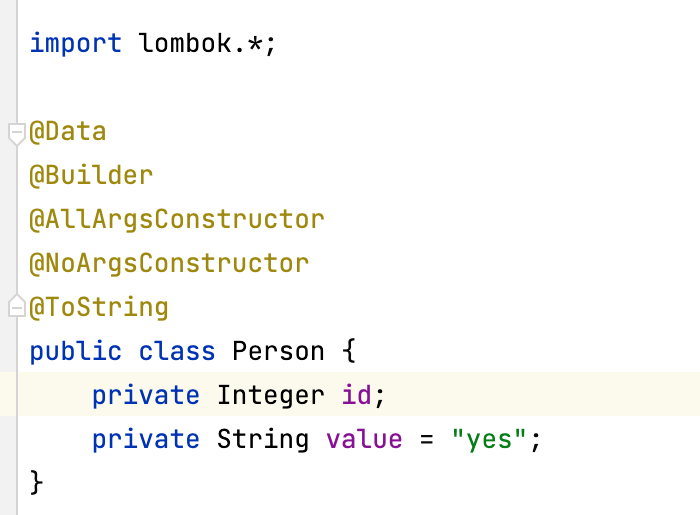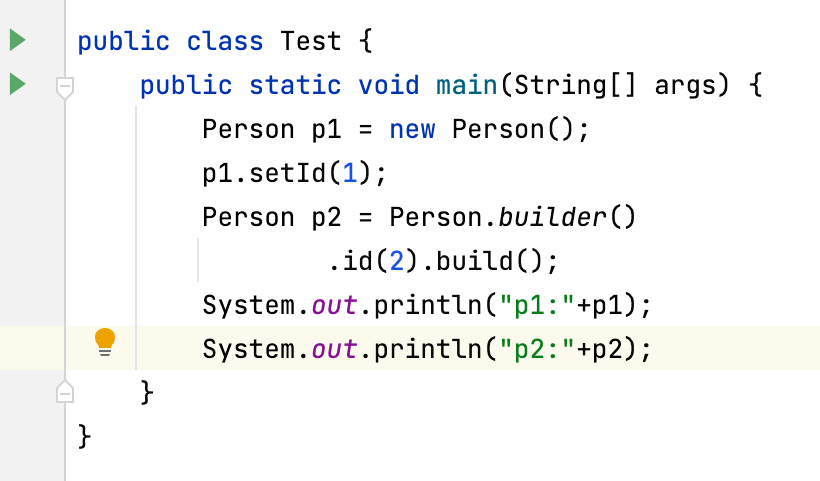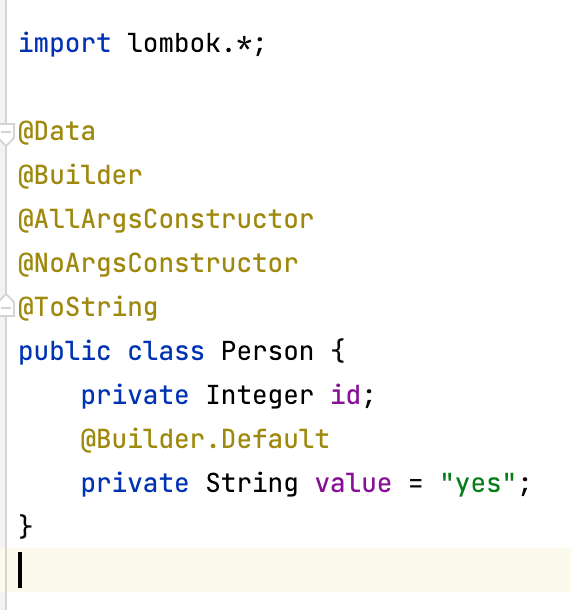lombok的@Builder注解的坑
2023-02-18 14:42 话猫 阅读(1666) 评论(2) 编辑 收藏 举报1.导致无参构造丢失
- 单独使用@Data注解,是会生成无参数构造方法。
- 单独使用@Builder注解,发现生成了全属性的构造方法。
@Data和@Builder一起用:我们发现没有了默认的构造方法。如果用@NoArgsConstructor注解会报错!
直接加上这4个注解
1 2 3 4 | @Data@Builder@AllArgsConstructor@NoArgsConstructor |
2.@Builder注解导致默认值失效



解决: 只需要在字段上面加上@Builder.Default注解即可,但是这样 new 出来得对象,默认值丢失


3.原因分析
我们使用注解的方式,底层本质就是反射帮我们生成了一系列的setter、getter,所以我们直接打开编译后的target包下面的.class文件,上面的所有原因一目了然!
我们想知道@Data、@Builder等注解底层到底做了什么,直接编译当前文件,即可在生成的.class字节码文件查看具体代码便知道了
@Builder 生成了一个内部类PersonBuilder,并针对每一个属性生成一个同名方法,builder()方法,将每个属性的值塞回到Person类中返回
1 2 3 4 5 6 7 8 9 10 11 12 13 14 15 16 17 18 19 20 21 22 23 24 25 26 27 28 29 30 31 32 33 34 35 36 37 38 39 40 41 42 43 44 45 46 47 48 49 50 51 52 53 54 55 56 57 58 59 60 61 62 63 64 65 66 67 68 69 70 71 72 73 74 75 76 77 78 79 80 81 82 83 84 85 86 87 88 89 90 91 92 93 94 95 96 97 98 99 100 101 102 103 104 105 106 107 108 109 110 111 112 113 114 115 116 117 118 119 120 121 122 | public class Person { private Integer id; private String value; private static String $default$value() { return "yes"; } public static Person.PersonBuilder builder() { return new Person.PersonBuilder(); } public Integer getId() { return this.id; } public String getValue() { return this.value; } public void setId(final Integer id) { this.id = id; } public void setValue(final String value) { this.value = value; } public boolean equals(final Object o) { if (o == this) { return true; } else if (!(o instanceof Person)) { return false; } else { Person other = (Person)o; if (!other.canEqual(this)) { return false; } else { Object this$id = this.getId(); Object other$id = other.getId(); if (this$id == null) { if (other$id != null) { return false; } } else if (!this$id.equals(other$id)) { return false; } Object this$value = this.getValue(); Object other$value = other.getValue(); if (this$value == null) { if (other$value != null) { return false; } } else if (!this$value.equals(other$value)) { return false; } return true; } } } protected boolean canEqual(final Object other) { return other instanceof Person; } public int hashCode() { int PRIME = true; int result = 1; Object $id = this.getId(); int result = result * 59 + ($id == null ? 43 : $id.hashCode()); Object $value = this.getValue(); result = result * 59 + ($value == null ? 43 : $value.hashCode()); return result; } public Person(final Integer id, final String value) { this.id = id; this.value = value; } public Person() { } public String toString() { return "Person(id=" + this.getId() + ", value=" + this.getValue() + ")"; } public static class PersonBuilder { private Integer id; private boolean value$set; private String value; PersonBuilder() { } public Person.PersonBuilder id(final Integer id) { this.id = id; return this; } public Person.PersonBuilder value(final String value) { this.value = value; this.value$set = true; return this; } public Person build() { String value = this.value; if (!this.value$set) { value = Person.$default$value(); } return new Person(this.id, value); } public String toString() { return "Person.PersonBuilder(id=" + this.id + ", value=" + this.value + ")"; } }} |




【推荐】国内首个AI IDE,深度理解中文开发场景,立即下载体验Trae
【推荐】编程新体验,更懂你的AI,立即体验豆包MarsCode编程助手
【推荐】抖音旗下AI助手豆包,你的智能百科全书,全免费不限次数
【推荐】轻量又高性能的 SSH 工具 IShell:AI 加持,快人一步
· 被坑几百块钱后,我竟然真的恢复了删除的微信聊天记录!
· 没有Manus邀请码?试试免邀请码的MGX或者开源的OpenManus吧
· 【自荐】一款简洁、开源的在线白板工具 Drawnix
· 园子的第一款AI主题卫衣上架——"HELLO! HOW CAN I ASSIST YOU TODAY
· Docker 太简单,K8s 太复杂?w7panel 让容器管理更轻松!